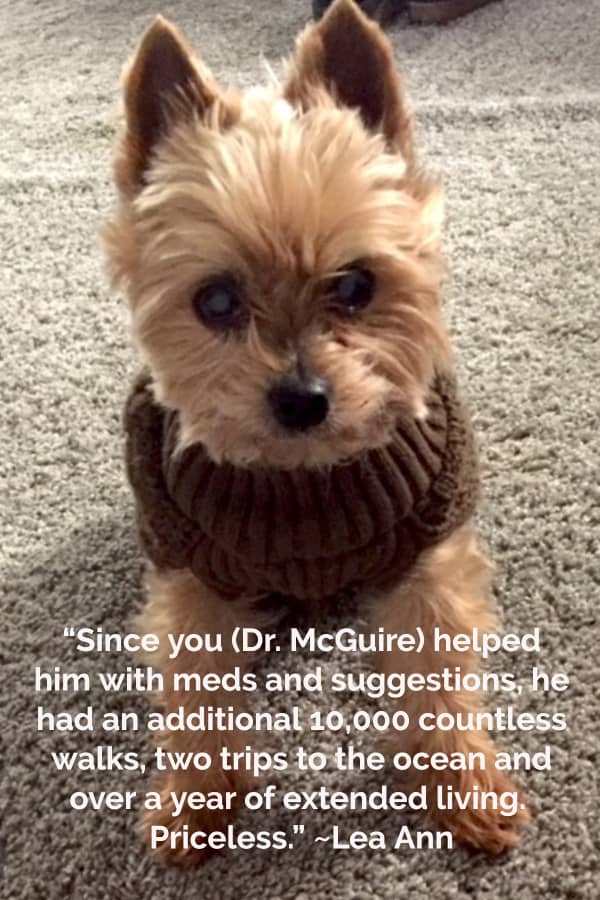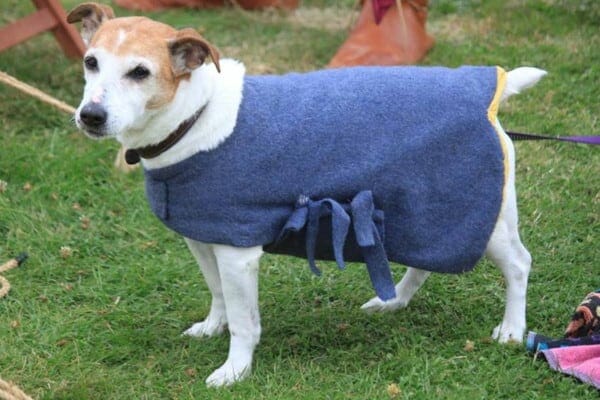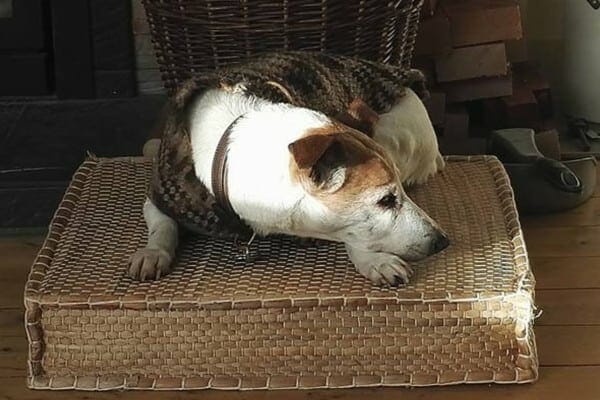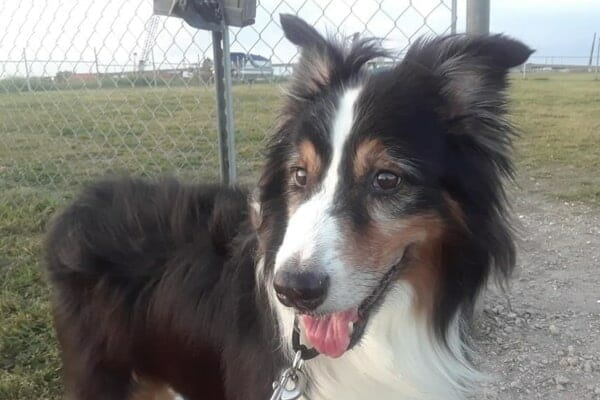How Much Do Seizure Service Dogs Cost
Exercise you wonder if your domestic dog is too old for surgery? Senior dogs certainly have their own surgical and coldhearted considerations. And then how do you know if surgery is the right thing for your dog? Integrative veterinarian Dr. Julie Buzby gives insight into deciding whether surgery may exist the right call for our geriatric friends.

"Only isn't my dog besides old for surgery?"
As an integrative veterinarian with over 25 years of experience caring for senior dogs, I field this question from pet parents on a regular basis. The answer may non be what you'd expect.
Age is non a disease, and your dog is never "too old" to receive the quality care he or she needs, even if it requires anesthesia and surgery.
Let'southward hash out how to reduce the risks of surgery for your senior dog and why quality care at every age is critical.
How to reduce the risks of surgery for your senior dog
Senior dogs can accept unique anesthetic considerations (run into Is My Dog As well Onetime for Anesthesia) and may have more prolonged recovery periods than their younger counterparts. But that doesn't hateful that surgery should be off the table for them.
The good news is that many older dogs can practice keen during and after surgery, and we stand a take chances at significantly improving their quality of life.
- A thorough piece of work-up prior to anesthesia should be part of the programme for any dog that is having surgery, but this is especially important for older dogs.
- Senior dogs can have underlying health problems that nosotros don't know near. Performing a physical test, diagnostic tests like blood work (including blood cell count and chemistry), Ten-rays, and sometimes even ultrasounds of the belly or heart (depending on what the surgery is and what the individual canis familiaris's health history is) may be warranted before proceeding. Identifying (and managing) underlying wellness concerns before surgery tin significantly reduce the risks of anesthesia.
- Your vet may also recommend more in-depth monitoring for your pet during surgery itself. Vets can routinely mensurate heart charge per unit, oxygen levels, trunk temperature, blood pressure level, and more.
- If your veterinarian doesn't have the monitoring equipment he or she thinks would be best for your canis familiaris's surgery, he or she may recommend referral to a lath-certified veterinary surgeon for the procedure.
With your dog's wellness history in mind, your vet tin steer you in the correct management to brand a sound decision on whether surgery is the best choice for your grey-muzzled companion.
Recently, I read the post-obit remarks from my colleague, Dr. Kelly McGuire, and I asked for her permission to share them. I couldn't concur more with her sentiment and I dear her perspective.
Yesterday I euthanized two of my long-term patients. 1 was Gabriel. He was a 17-year-quondam Cenotaph Terrier. When he was 15 I started seeing him. He had a murmur and cataracts and osteoarthritis. He was "quondam." He also had severe dental disease. I pretty much begged them to allow me do a dental. We did.
I made him not "sometime" for another 18 months. Their previous vet told them he was too old and not ok for anesthesia at 13. He was owned by two wonderful women who hugged me and thanked me for more than good times with him.

The other was Noel. She was almost xviii, I think. She had chronic kidney disease (CKD), hypothyroidism, a heart murmur in dogs, and a growing splenic tumor. I removed that spleen two years ago. She lived another two years until the CKD caught up with her. The ii men that owned her are astonishing and wonderful and thanked me for getting them more than time.
~Dr. Kelly McGuire, Park Loma Veterinary Medical Center, Denver Colorado
Will it e'er piece of work? No. But we've got to modify the mindset that says, "My dog is too old for surgery."
I work in a city and clinic that are constantly growing. Sometimes I even accept to disagree with what my clients have been told by other vets…I beg them to please finish telling people it can't be done. These animals and owners deserve a chance at more quality, pain-free time."

Dental surgery for senior dogs
My adjacent story comes from a friend and colleague, Dr. Christy Mackenzie. She gave me permission to share her account of choosing dental surgery for her ain domestic dog, who was eighteen years old when he had his dental!

~Dr. Christy MackenzieI tell people all the time that I anesthetized my 18-year-old Jack Russell Terrier, Kip, for a dental—six months before he passed abroad. He had moderately high liver values at the fourth dimension, but he needed it washed.
And so he had some other happy vi months, as opposed to not having some other happy six months. Worth every penny!
Was I scared near it? Of class, I was. I'm always a little scared for whatever patient that's going under anesthesia, in spite of trying to make it as condom as I can for every patient. But, to me, it'southward worth the risk to make them comfy and happy.
Plus, we found out at that last dental that while we thought all his teeth were
good for you, since he had had regular dental cleanings near of his life, he actually needed ii of his last molars removed (that couldn't be seen on
regular examination while awake). So we spared him a LOT of discomfort for those last six months!"

Ensuring senior dogs get the all-time quality of care
In all of these examples, I hope you can feel the gravity of the decisions. Equally veterinarians, nosotros don't take lightly that choosing surgery for a senior dog is a difficult decision. Veterinarians carefully examine each patient and perform appropriate lab piece of work and diagnostics in advance.
Significant thought and care go into custom formulating the anesthetic protocol for our senior patients. They receive intensive intendance and monitoring before, during, and later on the procedure.
The bottom line is this…we don't shy away from anesthetic procedures if there is a golden opportunity to improve our senior canine patients' quality of life.
Dental surgery for sometime dogs
For example, dental extractions nether anesthesia on senior dogs with "trench mouth" is one of the most rewarding parts of my chore. These patients feel
My terminal story comes from one of our ToeGrips® domestic dog smash grips customers, Cynthia. Recently, she shared with me her story well-nigh choosing surgery for her senior dog. With her permission, I'chiliad sharing her account and I hope that it helps others who are grappling with this decision.
A dog owner's decision to choose surgery for her senior domestic dog

Chopper is our 13-year-former black-tri Australian Shepherd who was intact until last week. He has ever been such a sweetness and loving boy! We had called not to neuter him afterward 2 litters of pups he sired because he was diagnosed with degenerative disc disease which led to a dorsal laminectomy at eight years old.
Following the surgery, nosotros felt he had suffered a stroke as he would not lie down. We were told by his doctor, a pinnacle neurosurgeon, that it was a behavioral disorder. We insisted this was not normal or behavioral, so they did a serial of spinal injections and he was able to slumber usually once more. Afterward all of that, we didn't want to put him through a surgery to neuter every bit he'd been through so much medically.
Just subsequently he turned x, I noticed a very slight change in his ear prepare; the right side looked a picayune dissimilar. Then off to the vet nosotros went. Upon initial test, we were once again referred to a specialist every bit a brain tumor was suspected.
A CT Scan was recommended and we agreed to the procedure. It did non show a tumor or cyst but it did ostend he'd had a stroke in the by. Not something I was happy to accept been correct about, but it did affirm I do know my canis familiaris.
Next was an MRI which did confirm there was a tumor/cyst applying force per unit area to the encephalon stalk and the fifth cranial nerve, perchance a nervus sheath tumor. There was no way to know without doing a triple craniotomy, which nosotros were not inclined to practise given the grave possible consequences…encephalon bleed, encephalon swelling, altering who he was mentally, and possibly not surviving the surgery.
The odds but were not in his favor.
Without surgery, they said nosotros probably had three months left with him. We were beyond devastated. We decided that we would continue to honey him and cherish every single twenty-four hour period.
Three months passed, and we still had our happy boy. Then half-dozen months, a year, then two. His vets were amazed!
A year agone, he began to accept incontinence issues. He would struggle to urinate but with a
much decreased stream. Our vet prescribed a medication to help with bladder control. That worked about six months until he began to have issues in one case again.Nosotros were out of boondocks working in Colorado and took him to a vet referred to us. Upon hearing his history, she suspected we were dealing with a prostate upshot equally opposed to the bladder. She ordered an abdominal ultrasound which showed an increased prostate. We stopped the bladder medication and started a regimen of prostate medication.
This worked virtually six months, until this February when it flared up once more but was definitely the worst it had ever been. Full incontinence with him wearing male person wraps/diapers. He was miserable and we were worn out from all the worry and the constant cleaning of him. This time we were in New Orleans, LA, and did non have a vet who knew his history.
Nosotros contacted the vet who treated him in Colorado and miraculously one of her all-time friends was in practice here in NOLA! She was able to become us an appointment the next day! We did full panels of bloodwork, a urine civilization, and repeated the abdominal ultrasound.
His prostate was over again very enlarged. The culture grew E. coli and staph bacteria so nosotros started him on antibiotics and discussed options. Given the brain "cyst," degenerative disc disease and prostate issue, we had to endeavor to decide which was causing the incontinence. Nosotros all agreed that the prostate was the most probable culprit and hands solved with
a neuter .Our only reluctance was anesthesia given his age and past medical challenges. We were worried that the few neurological side effects he did have could be permanently increased by the anesthesia.
The vet was very knowledgeable and
nice, and worked upwardly a programme for a short surgery with as few possibilities for issues as possible. We scheduled surgery for March 7 of this year. She planned to neuter, aspirate the prostate and get a sterile urine sample.I am extremely happy to study that he did very well in surgery with no complications, woke upward and recovered well from the anesthesia.
Withal, the first 24 hours, we did run across an increase of neurological symptoms which really scared us but the vet felt they would render to normal within 48 hours. Thankfully, they did and he was urinating normally within hours of the surgery.
He is interim as though he is immature again! I'm then thankful to accept had a squad of doctors who cared and then much about his quality of life! He has recovered and then much meliorate than nosotros could have ever expected!
And your ToeGrips gave him so much more than stability later on his back surgery! Thank you lot for all you do!"
-Cynthia Fowler
Because surgery for your senior dog? Take these 4 steps
If your veterinary is recommending surgery for your senior canis familiaris, it's because she or he believes that it will help your dog feel better, and maybe alive longer too!
Hither are specific steps to accept to help yous decide what's all-time for your dog:
1. Speak with your veterinarian about your concerns.
Take a frank discussion with your vet about surgery and share any concerns you accept. Veterinarians are well aware that anesthesia and surgery tin be life threatening for any creature and desire to make sure y'all equally a pet parent are comfortable moving frontwards. Open communication is best for everyone!
2. Discuss the pros and cons of surgery for your senior dog.
Ask your vet to lay out the pros and cons of the surgery. This way, y'all and your veterinarian will have a articulate thought about whether the benefits of surgery outweigh the risks.
3. Consider a referral to a veterinarian specialist.
If you or your veterinary feels uncomfortable virtually proceeding, you can ask for a referral to a specialty facility. Many referral hospitals have board-certified veterinarian surgeons and anesthesiologists. They also have specialized equipment that may maximize the chance of a positive outcome for your dog's surgery.
four. Remember, age is not a disease.
Delight don't write off a surgical process because of the myth that your dog is "besides old for surgery or anesthesia." Historic period is non a disease!
I promise these perspectives shed some additional low-cal on surgery for senior dogs, and that you feel empowered to make the all-time determination for your own dog.
Do you lot have questions well-nigh surgery for your senior dog?
Delight comment beneath.
How Much Do Seizure Service Dogs Cost,
Source: https://toegrips.com/is-my-dog-too-old-for-surgery/
Posted by: lyoncataing35.blogspot.com


0 Response to "How Much Do Seizure Service Dogs Cost"
Post a Comment